- Home
- William Miller
Noble Sanction
Noble Sanction Read online
Noble Sanction
William Miller
Contents
Chapter 1
Chapter 2
Chapter 3
Chapter 4
Chapter 5
Chapter 6
Chapter 7
Chapter 8
Chapter 9
Chapter 10
Chapter 11
Chapter 12
Chapter 13
Chapter 14
Chapter 15
Chapter 16
Chapter 17
Chapter 18
Chapter 19
Chapter 20
Chapter 21
Chapter 22
Chapter 23
Chapter 24
Chapter 25
Chapter 26
Chapter 27
Chapter 28
Chapter 29
Chapter 30
Chapter 31
Chapter 32
Chapter 33
Chapter 34
Chapter 35
Chapter 36
Chapter 37
Chapter 38
Chapter 39
Chapter 40
Chapter 41
Chapter 42
Chapter 43
Chapter 44
Chapter 45
Chapter 46
Chapter 47
Chapter 48
Chapter 49
Chapter 50
Chapter 51
Chapter 52
Chapter 53
Chapter 54
Chapter 55
Chapter 56
Chapter 57
Chapter 58
Chapter 59
Chapter 60
Chapter 61
Chapter 62
Chapter 63
Chapter 64
Chapter 65
Chapter 66
Chapter 67
Chapter 68
Chapter 69
Chapter 70
Chapter 71
Chapter 72
Chapter 73
Chapter 74
Chapter 75
Chapter 76
Chapter 77
Chapter 78
Chapter 79
Chapter 80
Epilogue
Can’t wait to find out what happens next?
Did you enjoy the Book?
About the Author
NOBLE SANCTION
Copyright © 2019 by William Miller.
All rights reserved. Printed in the United States of America. No part of this book may be used or reproduced in any manner whatsoever without written permission except in the case of brief quotations embodied in critical articles or reviews.
This book is a work of fiction. Names, characters, businesses, organizations, places, events and incidents either are the product of the author’s imagination or are used fictitiously. Any resemblance to actual persons, living or dead, events, or locales is entirely coincidental.
Book and Cover design by www.LiteraryRebel.com
First Edition: July 2019
Dedication and special thanks:
I owe a great debt of gratitude to former CIA field officer Andrew Bustamante for teaching me spycraft and helping me get the facts right.
I’d also like to thank the early readers for invaluable insight and feedback. Every book is a labor of love and your input was instrumental in bringing this one to print.
“I look inside myself and see my heart is black.”
~ Mick Jagger
Chapter One
Eliška Cermákova was stretched out over the engine block of a Dodge Charger. She had a wrench in one hand, straining against a stubborn bolt on a dead alternator. A vein stood out on her neck and beads of sweat glistened on her forehead. The muscles in her arms bunched. A giant fan cooled the sweat on her skin into a sticky shell. Rock ‘n’ roll blasted from a stereo in the corner. Metallica was hammering through Seek and Destroy. The smell of rubber and motor oil filled the garage. The bay door was up and hot South African sunshine reflected off an asphalt parking lot. The shop didn’t have a name, just a sandwich board out front that advertised, “Full Service Auto Repair. Brakes—Tires—Ice-Cold Air!”
Eliška wore a grease-stained tank top and cut-off shorts. Short blonde hair framed a pretty face. She gripped the wrench and flexed until she felt like she was about to give birth to her colon. The bolt refused to give. She let go with a frustrated sigh, straightened up, and palmed sweat from one cheek, leaving a dark streak on pale white skin.
“Need help?” Nelson asked. His name was stitched into the pocket of work-stained coveralls. He was a tall black man—six-foot-seven—with skin the color of eggplant. He had a Hyundai up on the lift and spoke without taking his eyes off his work.
“I got it,” Eliška assured him. She dropped the wrench on a rolling cart piled with tools, picked up a flathead and rummaged around until she found a small sledge. She braced the screwdriver against the bolt and tapped it with the hammer. That done, she grabbed the wrench and was about to try again when she felt her phone vibrating against her left butt cheek. She fished the mobile from her back pocket, recognized the number, and thumbed the green button. “When and where?”
“Café Organica,” her contact said in a rasping American accent. “One hour.”
Eliška glanced down at her grease-stained tank top. Damp cotton clung to her modest breasts and her nipples poked through. She said, “Can it wait? I need to change first.”
“Time is a factor.”
“You know I don’t like to be rushed,” Eliška told him.
“Don’t keep me waiting,” he said, and the line went dead.
Eliška pocketed the phone and cursed.
Nelson was shaking his head. “They call and you jump. Who is this new employer of yours?”
“You know better than to ask questions,” Eliška told him. In truth, she had no clue. The American had contacted her six months ago and, despite her best efforts at uncovering his identity, he remained a complete mystery. He paid top dollar though. That was enough for Eliška. She said, “I’m going to need a clean set of wheels.”
“Take the Lexus.” Nelson unzipped his coveralls to reveal a nickel-plated revolver stuffed in the waistband of his pants. “Need this?”
Eliška hesitated only a second before shaking her head. “No. I’ll be alright.”
“Be safe.”
She grabbed a heavy canvas jacket covered in old oil stains from a hook by the door. The keys to the Lexus hung on a peg board. She shrugged into the jacket as she stepped outside. Heat clobbered her and the thick jacket only made it worse. The black IS 350 was parked around the side of the shop. Eliška thumbed the fob. The doors unlocked with a chirrup. She climbed inside and headed west, into the heart of Johannesburg.
Forty-five minutes later, Eliška backed into an empty spot across from a bustling shopping arcade dedicated to free trade and sustainable living. The sun was a shimmering yellow disc in a cloudless blue sky. Eliška edged the gleaming black Lexus up to the curb and killed the engine. The car turned into a sweat box as soon as the air conditioner cut out. April in South Africa is arid and hot with little rain and less shade. The altitude makes skin cancer a major concern, especially for someone as pale as Eliška.
She checked for traffic before climbing out. Long legs carried her across the quiet boulevard, past a vinyl shop and a bonsai nursery, to a fair-trade coffee shop. A pair of black women, arms weighed down with shopping bags, gave her a nasty look as she passed. The American sat at an outdoor table shaded by a large canvas umbrella. A cigarette dangled from one corner of his mouth. He wore a beige summer-weight suit over a black button-down. A copy of the Johannesburg City Press lay on the table next to a cup of coffee with enough cream and sugar
to make a spoon stand up straight.
Eliška took a seat across from him.
He pushed back his cufflink and glanced at a Rolex Submariner. “You’re late.”
“You’re lucky I’m here at all,” she told him. “I don’t like being called across town for a meeting last-minute. Especially now. A couple of whites downtown are just asking for trouble.”
The American was a cool customer. He didn’t seem disturbed by the crowd or the hostile looks. White farmers in South Africa were being slaughtered by angry black mobs, but the American lounged in his chair like he didn’t have a care in the world. He said, “They never should have ended apartheid.”
“You didn’t call me out here to discuss race relations,” Eliška said. She wasn’t concerned equal rights in South Africa. Whites had mistreated blacks for decades. Now blacks were mistreating whites. Round and round it goes. Where it stops? Nobody knows. Probably, it would end when some fool launched a nuke and blew up the world. Not Eliška’s problem. She said, “What have you got for me?”
“One last job.”
“I’m listening.”
The American—Eliška had come to think of him as Bob—slid a tablet computer across the tablecloth. She woke it up and found a black-and-white headshot of a middle-age man with a bad comb-over and fleshy jowls.
Bob said, “You’ll find the relevant details on a file folder. The target’s name is P. Arthur Fellows. He works for the Secret Service. We need it to look like an accident.”
Eliška was already shaking her head. “No way. You know the rules. I don’t take jobs in America.”
“We’re prepared to triple what we paid you last time.” He took a thick envelope from his pocket and laid it on the table. “Half up front, of course.”
That got Eliška’s attention. She sat there, staring at the black-and-white, trying to think of all the reasons not to do it. Bob, and whoever he worked for, were good clients. They paid promptly in dollars and didn’t ask questions. But Eliška only had a few hard rules: No children, and no jobs inside the United States. America’s law enforcement was too well-connected, and they took contract killing very serious. There was too much chance she would end up on the FBI’s most-wanted list. She put the tablet back on the table and shook her head. “Sorry. The answer is no. Find somebody else.”
“We want you,” Bob said. He leaned back and breathed smoke.
“The answer is still no.” Eliška stood up to leave.
He took the cigarette from his mouth and said, “That’s unfortunate, Ms. Cermákova.”
Eliška’s blood ran cold. She hadn’t used that name in eight years. She looked around to see if anyone had heard before lowering herself back into the seat. “How the hell do you know my name?”
“I know everything about you,” Bob said. “Maybe the Czech Republic would be interested to know where you’ve been hiding these last few years?”
Eliška leaned across the table and jabbed a finger into Bob’s chest. “Make another threat, and I’ll spill your guts all over the sidewalk.”
“I really hoped it wouldn’t come to this,” he said and managed to look disappointed. He put a hand inside his jacket, brought out a grainy surveillance photo and dropped it on the table.
Eliška picked up the photograph with trembling fingers. It showed an old man with an oxygen tank hobbling up a sidewalk in Prague. She whispered, “Damn you to hell.”
“The choice is yours, Ms. Cermákova,” Bob said. “The carrot or the stick? You’re going to eliminate P. Arthur Fellows for us, or dear old daddy will have an accident.”
Her throat clutched. She managed to croak out, “Leave my papa alone!”
“That’s entirely up to you.”
Eliška stuffed the picture in the pocket of her grease-stained work coat. She wanted to rip the American’s throat open with her bare hands. Instead, she said, “I’ll do it, but this is the last job. You understand me? After this, we’re through. Tell your employer to find somebody else.”
Bob inclined his head. “Show me proof of death, and you’ll never hear from me again.”
“And I have your word my father will be left alone?”
“I swear it.”
Eliška knew he was lying. As long as she was alive, her father would never be safe. She didn’t know how the American had learned her real name. In the end, it didn’t matter. She needed to kill P. Arthur Fellows and then find a way to disappear or spend the rest of her life at Bob’s beck and call. She grabbed the envelope with the cash and the tablet computer. “I’ll let you know when it’s done.”
A smile played across Bob’s weathered face. “I look forward to hearing from you.”
Chapter Two
Forty-eight hours later, Eliška Cermákova touched down at JFK International. Tires shrieked on the tarmac and the fuselage rattled hard. A handful of passengers applauded the successful landing. Eliška arched her back and rubbed sleep from her eyes. A yawn tried to split her jaw in two. She covered her mouth with the back of one hand. She had spent the last two days cooped up on airline seats. From Johannesburg, she had flown to Egypt, Egypt to Paris, Paris to Turkey, then China, Vancouver, and finally into New York—all on a series of fake passports.
While the airbus taxied to the terminal, Eliška stood up, stretched, and reached for her bag. She was no longer blonde. Now she had long chestnut curls and a beauty mark on her left cheek to match her Canadian passport. She checked herself in a compact mirror while she waited for the plane to marry up with the exit ramp and then followed the rest of the passengers to customs. She flashed a smile at the young immigration officer and his rubber stamp came down with a thump. He told her enjoy her stay. She could feel his eyes on her butt as she walked away.
So far so good, Eliška thought. From there, she followed the signs to long-term parking. A gust of cold air hit her as she stepped off the elevator. Fluorescents reflected on the roofs of the cars and cast the empty lot in a sickly green glow. The smell of rubber and urine mixed together in a pungent cocktail.
Long-term parking is the perfect place to pick up a clean set of wheels. The owners are out of town and ticket stubs are clearly displayed. A gunmetal-grey Camaro near the elevators caught her eye. It had only been there two days. She threw a quick glance around, reached in her backpack, brought out a laptop and set to work hacking the Camaro’s CAN bus system.
Modern cars are basically computers on wheels. Everything in the vehicle is controlled by an electronic control unit. Anyone with a laptop and a little bit of know-how can remotely access the system and send commands to the ECU. Eliška balanced the laptop on one knee while she pecked at the keys. It took less than three minutes to pinpoint the Camaro’s CAN bus and override the access codes. The doors unlocked with a chirp.
Five minutes later, she was pulling out of the long-term lot onto the Belt Parkway, headed west toward New Jersey. She hit Newark at rush hour and crept through traffic until she made it onto the New Jersey Turnpike. From there it was a four-hour drive to DC. She reached into her bag for her phone, queued up some heavy metal, and stuck one headphone in her ear. The sun was going down in the west and a bank of dark clouds was crawling up from the south, promising rain.
Eliška pulled into a roadside motel somewhere north of Baltimore. She had heard stories of Mobtown. None of them good. The motel was a squat concrete bunker of fading paint with doors that opened onto the parking lot and a flickering neon sign advertising vacancies. Eliška paid cash and parked the stolen Camaro outside the door to number twenty-seven.
The room was depressing, with walls so thin she could hear the couple next door. She put the chain on the door, took a rubber wedge from her bag and jammed it in place, then used the toilet before her bladder exploded. She had been holding it for the last two hundred miles. With that taken care of, she stretched out on the bed. She didn’t bother to undress. She wasn’t going to be here long. She took out her cellphone, dialed a number by heart, and hesitated before pressing send.
>
Do it, she told herself. Make the call.
Her thumb tapped the green button and the call went through.
The old man picked up after a dozen rings.
Eliška said, “Dobry den, Baba.”
“Eliška?” he spoke in Czech. “Is that you?”
“It’s me, Papa. How are you feeling?”
She heard him take a hit of oxygen. “How much trouble are you in?”
“No trouble,” Eliška lied. “I’m just checking up on you, Papa. Has anyone come by the apartment lately?”
“No.” He cleared his throat with a loud hacking noise. “No one comes here. The only company I get is a man from the hospital. He stops by once a week to drop off new tanks. Are you sure you aren’t in some kind of trouble?”

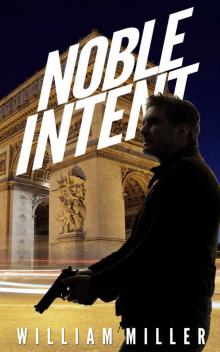 Noble Intent
Noble Intent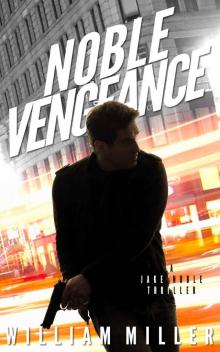 Noble Vengeance
Noble Vengeance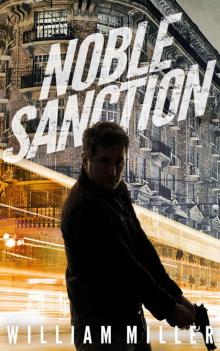 Noble Sanction
Noble Sanction Gloucester Crescent
Gloucester Crescent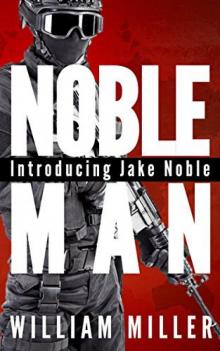 Noble Man
Noble Man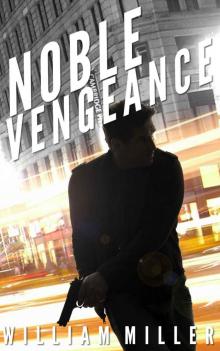 Noble Vengeance (Jake Noble Series Book 2)
Noble Vengeance (Jake Noble Series Book 2)